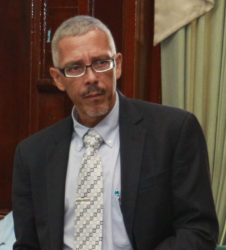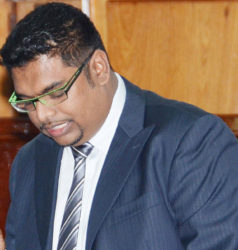PPP/C parliamentarian Irfaan Ali yesterday took aim at government’s proposed $250 billion budget, saying it was “saturated with taxes” that will “suffocate” both traditional and non-traditional businesses next year.
Ali said it was hardly surprising that the government was projecting a “whopping” $13.1 billion increase in its tax revenues and he pointed to the proposed application of a 14% Value-Added Tax (VAT) on water and electricity bills in excess of $1,500 and $10,000, respectively, and the VAT exemption on goods previously zero-rated and the environmental taxes. He said while some residential consumers would be able to avoid VAT on water and electricity, this might not be possible for businesses.
“While the adjustment to the corporation tax rates will provide some ease to businesses, the other measures will see the private sector losing more in the form of new taxes,” Ali told the National Assembly on the first day of the budget debate, which, unlike in past years, commenced in the morning hours.

But while Ali’s outlook was gloomy, the first speaker on the government’s side, Minister of Business Dominic Gaskin, described the budget as being both “pro-business and pro-worker.”
“Budget 2017 depicts a good life for all Guyanese and this is what we must work to achieve,” he said in closing a speech in which he gave a rundown of what his ministry achieved during this year and what is expected to happen in the new year.
He said that the targeted 3.8% growth in 2017 demanded confidence in the economy at all levels “and we should avoid the temptation to talk ourselves out of the good life.”
‘Reinventing the wheel’

Ali said he was also worried about the government’s plans to compete with private businesses for funds in the financial sector by the issuance of bonds. This move, he said, was “dangerous, especially when businesses are experiencing a reduction in internal funds due to the contraction of sales, which in turn is caused by our economic downturn.”
Ali said he was also “challenged” to find measures that will green and diversify the economy as well as deliver the “good life” that the government has been promising. “Mr Speaker, given the proposed measures in the 2017 national budget, we have to ask ourselves, ‘How serious is the government with respect to the greening and/or diversifying the economic base of our country?’” he observed.
He said while his government would have spent resources and time in developing a comprehensive Low Carbon pathway, the current government now plans to “reinvent the wheel” by crafting a new green strategy.
“While we await this plan, we are told that the measures presented in the 2017 budget captures the essence of the green agenda or as the minister puts it, “an articulation of the APNU/AFC green agenda.” [But] based on the proposed measures, it is obvious that the government is unclear about what it means to green an economy,” Ali said.
He noted that greening an economy was not restricted to the elimination of the country’s dependence on fossil fuels but also involved shifting to economic activities that were environmentally-friendly and economically-feasible as he lamented measures that he said would not “green” the income of businesses.
Low economic growth
Meanwhile, he described the 2.6% economic growth in 2016 as the lowest recorded in the last eight years, which cannot be pegged to external factors or the state of the economy when the government took office last year.
According to Ali, who had served as housing minister in the former PPP/C government, the economy was paralysed by the poor policies of the government, which generated considerable uncertainty and in turn discouraged investment by the private sector. He also chided the administration for what he described as the ineffective implementation of the public sector investment programme (PSIP) that starved the economy of $15.9 billion.
Ali said the economy also suffered from the 130-plus tax measures introduced in the 2016 budget, which squeezed almost every entrepreneur, and from the absence of specific initiatives to support the key sectors, such as rice, small-scale mining industry and sugar industry.
He boasted that the PPP/C government “bequeathed” an economy that was not only diversified but weathered the global economic and financial crises, which assisted the present government in awarding its ministers a 50% increase in salaries; to finance the D’ Urban Park project; to pay out billions to several countries; and to rent a bond for storing medical supplies when there was no need for such a facility. The latter refers to the government’s controversial rental of a building in Sussex Street from businessman Larry Singh.
Ali said the government has also doubled the number of contract workers in its first year, removed limitation on overseas travel to cover expenses for ministers and their spouses and has presented to the House the Hamilton Green Pension Bill, which he said will cost the country more than $20 million annually.
Impressive contribution
Meanwhile, with the Ministry of Business’ total budget at just over $1.7 billion, Gaskin said it will make an impressive contribution to Guyana’s long-term economic well-being, worth well in excess of the size of the investment.
He used his address to recognise the work of the Guyana National Bureau of Standards in developing the kind of industries the country needs if it is to become more diversified. He pointed out that industry standards were demanded by the international market and he said it was in Guyana’s best interest that such standards were adopted if it wished to do business with the rest of the world.
For this to be done, however, he noted that there was need for an accredited and recognised agency and this process was closer to being achieved with the help of a recent US$9 million loan from the Inter-American Development Bank.
“Guyana’s national quality infrastructure will be upgraded to allow for increased testing and certification to be carried out in Guyana,” he said, while explaining that the project will entail a new laboratory being constructed as well as upgrades to several others.
The project will also see the development of a new export strategy and a complementary national investment strategy. “This project will place Guyana’s economy on a sustainable development pathway by supporting our value-added exporting industries in a serious way,” he added.
Turning to the Guyana Office for Investment (GO-Invest), Gaskin said it continued to make its contributions by promoting and supporting investment, while also promoting the export of local goods. He said for the year the agency facilitated 83 projects, including 16 foreign direct investments across eight economic sectors.
“The potential value of investment facilitated during this period amounted to approximately $114 billion with approximately six thousand jobs estimated to be created as a result,” he said, repeating statistics cited by the Finance Minister during his budget presentation last week.
The agency is also expected to facilitate a policy strategy this year.
Gaskin said too that industrial estates remain important and in 2016 nearly $30 million was awarded to the Coldingen Estate, and $43 million for the commencement of phase two of the new Lethem Industrial Estate. This estate is expected to be completed in 2018 and will cater for approximately 70 businesses as well as a business incubator for small businesses.
He also said that a total of $287 million will be spent on industrial estates and a new policy on industrial estates will be implemented.
In the area of tourism he said the industry needed to be developed with an understanding with how the international industry works. He said a national tourism
policy, which has been drafted and was under consultation, would raise awareness about the value of the industry and the opportunities it can create.
Gaskin also said the environment in which Guyana’s economic achievements take place was of critical importance and must be an enabling one. As a result, he said, in 2016 his ministry made a commitment to improve that environment so that private businesses operating in Guyana could do so in an efficient and cost effective manner, thereby making them more profitable and more competitive.
“Our ministry initiated collaboration with the World Bank to address directly the indicators where Guyana ranked badly on the 2016 Doing Business Index,” Gaskin said.
He revealed that the report, which represented the period ending on June 1, 2015, “was fairly unflattering and did not present Guyana in a way that was attractive to investors.”
He added that over the next few years a lot of work is to be done in correcting the deficiencies that place the country at a disadvantage in attracting investors and place businesses at a disadvantage when operating in Guyana.




